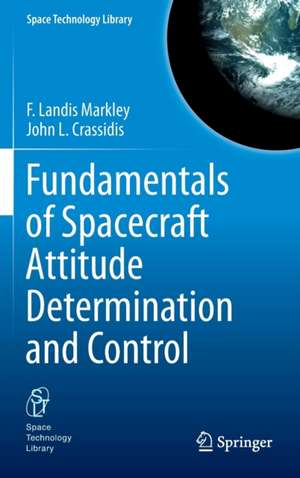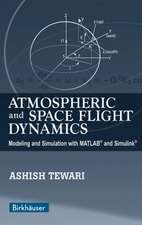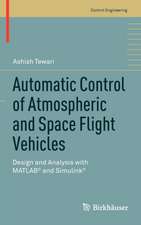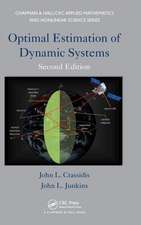Fundamentals of Spacecraft Attitude Determination and Control: Space Technology Library, cartea 33
Autor F. Landis Markley, John L. Crassidisen Limba Engleză Hardback – iun 2014
Subject matter includes both theoretical derivations and practical implementation of spacecraft attitude determination and control systems. It provides detailed derivations for attitude kinematics and dynamics and provides detailed description of the most widely used attitude parameterization, the quaternion. This title also provides a thorough treatise of attitude dynamics including Jacobian elliptical functions. It is the first known book to provide detailed derivations and explanations of state attitude determination and gives readers real-world examples from actual working spacecraft missions. The subject matter is chosen to fill the void of existing textbooks and treatises, especially in state and dynamics attitude determination. MATLAB code of all examples will be provided through an external website.
| Toate formatele și edițiile | Preț | Express |
|---|---|---|
| Paperback (1) | 537.65 lei 6-8 săpt. | |
| Springer – 3 sep 2016 | 537.65 lei 6-8 săpt. | |
| Hardback (1) | 713.33 lei 6-8 săpt. | |
| Springer – iun 2014 | 713.33 lei 6-8 săpt. |
Din seria Space Technology Library
- 20%
 Preț: 569.37 lei
Preț: 569.37 lei - 17%
 Preț: 363.73 lei
Preț: 363.73 lei - 20%
 Preț: 476.04 lei
Preț: 476.04 lei - 18%
 Preț: 947.98 lei
Preț: 947.98 lei - 15%
 Preț: 643.99 lei
Preț: 643.99 lei - 18%
 Preț: 1688.57 lei
Preț: 1688.57 lei - 18%
 Preț: 957.75 lei
Preț: 957.75 lei - 18%
 Preț: 1393.27 lei
Preț: 1393.27 lei -
 Preț: 393.35 lei
Preț: 393.35 lei - 18%
 Preț: 956.03 lei
Preț: 956.03 lei - 15%
 Preț: 647.08 lei
Preț: 647.08 lei -
 Preț: 429.69 lei
Preț: 429.69 lei - 24%
 Preț: 1057.68 lei
Preț: 1057.68 lei - 18%
 Preț: 1215.04 lei
Preț: 1215.04 lei - 24%
 Preț: 810.45 lei
Preț: 810.45 lei - 18%
 Preț: 1009.08 lei
Preț: 1009.08 lei - 18%
 Preț: 955.40 lei
Preț: 955.40 lei - 18%
 Preț: 947.50 lei
Preț: 947.50 lei - 15%
 Preț: 584.92 lei
Preț: 584.92 lei - 15%
 Preț: 647.40 lei
Preț: 647.40 lei - 18%
 Preț: 1834.77 lei
Preț: 1834.77 lei - 15%
 Preț: 590.16 lei
Preț: 590.16 lei - 15%
 Preț: 600.30 lei
Preț: 600.30 lei - 23%
 Preț: 739.84 lei
Preț: 739.84 lei - 18%
 Preț: 998.66 lei
Preț: 998.66 lei - 23%
 Preț: 748.98 lei
Preț: 748.98 lei
Preț: 713.33 lei
Preț vechi: 839.21 lei
-15% Nou
Puncte Express: 1070
Preț estimativ în valută:
136.49€ • 142.89$ • 112.94£
136.49€ • 142.89$ • 112.94£
Carte tipărită la comandă
Livrare economică 05-19 aprilie
Preluare comenzi: 021 569.72.76
Specificații
ISBN-13: 9781493908011
ISBN-10: 1493908014
Pagini: 504
Ilustrații: XV, 486 p. 96 illus., 4 illus. in color.
Dimensiuni: 155 x 235 x 35 mm
Greutate: 0.88 kg
Ediția:2014
Editura: Springer
Colecția Springer
Seria Space Technology Library
Locul publicării:New York, NY, United States
ISBN-10: 1493908014
Pagini: 504
Ilustrații: XV, 486 p. 96 illus., 4 illus. in color.
Dimensiuni: 155 x 235 x 35 mm
Greutate: 0.88 kg
Ediția:2014
Editura: Springer
Colecția Springer
Seria Space Technology Library
Locul publicării:New York, NY, United States
Public țintă
GraduateCuprins
Attitude Determination and Estimation.- Matrices, Vectors, Frames, Transforms.- Rotational Kinematics and Dynamics.- Sensors and Actuators.- Static Attitude Determination Methods.- Filtering for Attitude Determination.- Attitude Control.
Recenzii
“The present book presents the fundamental concepts and mathematical basis for spacecraft attitude description and control. … Every chapter and appendix contains a rich references. After reading this book, the reader will be convinced that the intended audience for it consists of graduate students, Ph.D. students and scientists with an interest in spacecraft attitude determination and control.” (Clementina Mladenova, zbMATH 1381.70006, 2018)
“It is of exceptional quality in both the range of subjects covered and the detail of that coverage. … this book has a lot to offer to those of us involved in the developments and data processing for such projects, describing in detail external forces as well as the effects of non-rigidity. … this is a very worthwhile volume, highly recommended for anyone involved in astronomical or other satellite projects.” (Floor van Leeuwen, The Observatory, Vol. 135 (1246), June, 2015)
“This is an excellent book. Markley … and Crassidis (Univ. of Buffalo) have succeeded in creating a work that is a good textbook for both upper-level undergraduate and graduate students as well as practitioners. … book ends with several appendixes that further support the rest of the book and also provide novice practitioners with a good resource to help them understand the more technical and complicated material. … Summing Up: Highly recommended. Aerospace engineering collections serving upper-division undergraduates through professionals/practitioners.” (D. B. Spencer, Choice, Vol. 52 (7), March, 2015)
“It is of exceptional quality in both the range of subjects covered and the detail of that coverage. … this book has a lot to offer to those of us involved in the developments and data processing for such projects, describing in detail external forces as well as the effects of non-rigidity. … this is a very worthwhile volume, highly recommended for anyone involved in astronomical or other satellite projects.” (Floor van Leeuwen, The Observatory, Vol. 135 (1246), June, 2015)
“This is an excellent book. Markley … and Crassidis (Univ. of Buffalo) have succeeded in creating a work that is a good textbook for both upper-level undergraduate and graduate students as well as practitioners. … book ends with several appendixes that further support the rest of the book and also provide novice practitioners with a good resource to help them understand the more technical and complicated material. … Summing Up: Highly recommended. Aerospace engineering collections serving upper-division undergraduates through professionals/practitioners.” (D. B. Spencer, Choice, Vol. 52 (7), March, 2015)
Notă biografică
Dr. F. Landis Markley has been a leader in spacecraft attitude estimation as well as one of the most important mission engineers. He joined the Computer Sciences Corporation in 1974 and established himself as an expert on all aspects of spacecraft attitude mission support. He moved to the U. S. Naval Research Laboratory in 1978 and to NASA Goddard Space Flight Center in 1985. Since 2010, he has been Aerospace Engineer Emeritus in Goddard's Attitude Control Systems Engineering Branch. He has supported more than twenty space missions, most notably the Hubble Space Telescope, the Tropical Rainfall Measuring Mission and the Wilkinson Microwave Anisotropy Probe. Dr. Markley is the author of many classic papers in spacecraft attitude estimation, dynamics, and control. He was one of the principal contributors to the book “Spacecraft Attitude Determination and Control” (Springer, 1978), which has been essential to the education of many astronautical engineers. He was elected Fellow of the AIAA in 1998 and of the AAS in 2007 and has been a Goddard Senior Fellow since 2000. He is a recipient of the NASA Exceptional Service Medal (1994 and 2005), the AIAA Mechanics and Control of Flight Award (1998), and the AAS Dirk Brouwer Award (2005).
Dr. John L. Crassidis is the CUBRC Professor in Space Situational Awareness of Mechanical and Aerospace Engineering at the University of Buffalo (UB). Currently, he is the Director of UB's Center for Multisource Information Fusion. Before joining UB in 2001, he held previous academic appointments at Catholic University of America (1996-1998) and Texas A&M University (1998-2000). He also held a position as a NASA Postdoctoral Research Fellow at Goddard Space Flight Center (1996-1998). While at NASA-Goddard he worked on a number of mission projects, such as the Tropical Rainfall Measurement Mission, the Geostationary Operational Environmental Satellite, and the Wilkinson Microwave Anisotropy Probe. He is first author tothe book “Optimal Estimation of Dynamic Systems,” which is currently in its second edition. He was elected Fellow of the AAS in 2014 and Associate Fellow of the AIAA in 2002. He is a recipient of the AIAA Mechanics and Control of Flight Award (2012) and several teaching awards.
Dr. John L. Crassidis is the CUBRC Professor in Space Situational Awareness of Mechanical and Aerospace Engineering at the University of Buffalo (UB). Currently, he is the Director of UB's Center for Multisource Information Fusion. Before joining UB in 2001, he held previous academic appointments at Catholic University of America (1996-1998) and Texas A&M University (1998-2000). He also held a position as a NASA Postdoctoral Research Fellow at Goddard Space Flight Center (1996-1998). While at NASA-Goddard he worked on a number of mission projects, such as the Tropical Rainfall Measurement Mission, the Geostationary Operational Environmental Satellite, and the Wilkinson Microwave Anisotropy Probe. He is first author tothe book “Optimal Estimation of Dynamic Systems,” which is currently in its second edition. He was elected Fellow of the AAS in 2014 and Associate Fellow of the AIAA in 2002. He is a recipient of the AIAA Mechanics and Control of Flight Award (2012) and several teaching awards.
Textul de pe ultima copertă
This book explores topics that are central to the field of spacecraft attitude determination and control. The authors provide rigorous theoretical derivations of significant algorithms accompanied by a generous amount of qualitative discussions of the subject matter. The book documents the development of the important concepts and methods in a manner accessible to practicing engineers, graduate-level engineering students and applied mathematicians. It includes detailed examples from actual mission designs to help ease the transition from theory to practice, and also provides prototype algorithms that are readily available on the author’s website.
Subject matter includes both theoretical derivations and practical implementation of spacecraft attitude determination and control systems. It provides detailed derivations for attitude kinematics and dynamics, and provides detailed description of the most widely used attitude parameterization, the quaternion. This title also provides a thorough treatise of attitude dynamics including Jacobian elliptical functions. It is the first known book to provide detailed derivations and explanations of state attitude determination, and gives readers real-world examples from actual working spacecraft missions. The subject matter is chosen to fill the void of existing textbooks and treatises, especially in state and dynamics attitude determination. MATLAB code of all examples will be provided through an external website.
Subject matter includes both theoretical derivations and practical implementation of spacecraft attitude determination and control systems. It provides detailed derivations for attitude kinematics and dynamics, and provides detailed description of the most widely used attitude parameterization, the quaternion. This title also provides a thorough treatise of attitude dynamics including Jacobian elliptical functions. It is the first known book to provide detailed derivations and explanations of state attitude determination, and gives readers real-world examples from actual working spacecraft missions. The subject matter is chosen to fill the void of existing textbooks and treatises, especially in state and dynamics attitude determination. MATLAB code of all examples will be provided through an external website.
Caracteristici
Provides an in-depth treatise of attitude kinematics and dynamics Contains detailed derivations and implementations of attitude determination algorithms Includes real-world examples from actual working spacecraft missions Includes supplementary material: sn.pub/extras









